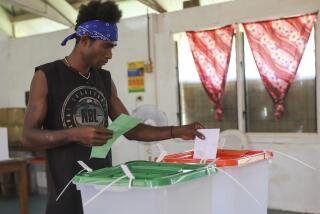East Timorese Wary About Autonomy Vote
- Share via
DILI, Indonesia — After 23 years of brutal rule, the Indonesian government has agreed to give the people of East Timor what many have long fought for--a vote on their future--but there was little celebration in the island territory Friday.
On Thursday, U.N. Secretary-General Kofi Annan announced a deal under which East Timorese at home and abroad will be able to vote, it is hoped before August, on an autonomy proposal.
Residents in the troubled province were cautious in reacting to the news from New York, where in U.N.-sponsored talks with Portugal, Indonesia cast aside fears of encouraging other rebellious provinces in agreeing to let the East Timorese vote on whether to accept the offer of enhanced autonomy.
Pro-independence leaders in East Timor were skeptical, and pro-government loyalists feared an upsurge in bloodshed.
Rejection could open the way for independence--an outcome closely eyed by separatist groups across the diverse archipelago.
Indonesia invaded East Timor, a former Portuguese colony, in 1975 and annexed it the next year, in a move not recognized by the U.N.
Its reputation blackened by the East Timor saga and its resources stretched to breaking by mounting civil unrest across the country, the government in January abruptly dropped its blanket opposition to independence.
However, it still believes that autonomy is the best solution for the eastern half of Timor island.
It has also rejected any suggestion that freeing East Timor will set a precedent for other restive provinces where separatist movements have long fought central rule.
East Timorese rebel leader Jose Alexandre “Xanana” Gusmao welcomed a vote during a news conference in the Indonesian capital, Jakarta, where he is under house arrest, but he said more details are needed.
Portuguese Foreign Minister Jaime Gama, who had accused the Indonesians of backpedaling and trying to delay a solution, called the agreement “a turning point.”
Indonesian Foreign Minister Abdullah Ali Alatas said Thursday that a “full-fledged referendum” would risk increased violence in the already troubled territory and would take too long to organize.
Instead, a direct vote will be organized and held under U.N. auspices, but not with all the official requirements of a referendum.
More to Read
Sign up for Essential California
The most important California stories and recommendations in your inbox every morning.
You may occasionally receive promotional content from the Los Angeles Times.











